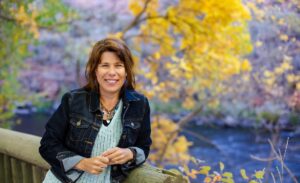There are only a few MFAs in Nature Writing in this country, and Colorado offers one
Writing climate chaos creates community
Writing climate chaos creates community
Evonne lives in a fire lookout in Oregon, and since I meet with these graduate students weekly on Zoom, we’ve all seen snippets of her life, including the dizzying moments when she leaps up to do a 360 to scan for fires while holding her tablet. We’re treated to a bit of a roller-coastery tumble of distant trees and skies before she settles back down, her smiling face back on our screens—unless, of course, her tablet overheats, in which case we are put into her fridge, and we get the view from there.
Boring classes, these are not.
This Master of Fine Arts program with an emphasis in Nature Writing is one of three or four in the country, and the only one I know of that has a collaboration with a press—one manuscript from a current student or alumni is published each year by Western Press Books. There are also internships, a new eco-poetics track and fantastic faculty. But perhaps the thing I love most about this program is our weekly zoom. I’ve come to believe that a “packet-style” approach to MFAs is not the best approach, and instead, Western Colorado University has forged a new path: weekly zooms and workshop that recreate the brick-and-mortar experience, but with the added benefit of being low residency, meaning students and faculty live anywhere.
Including fire towers.
And interestingly, this informs our content quite a lot. Whether it’s from a ranch in Colorado, a beach in California, a suburb in Florida, an off-the-grid house in the Bahamas or a fire lookout in Oregon, we are able to bring our lives to one another. For example, we learn tidbits about lookout life—how Evonne does dishes with minimum water use, since it needs to be carried in; or the mice and chipmunks; or how her “lookout buddies” hike up and bring her food and mail.

Laura Pritchett
It’s true that since this is an MFA in Nature Writing, there are a lot of outdoorsy people who zoom in from all sorts of exciting places, such as the back of vans and the hallways of hotel rooms since they’re enroute somewhere, but also, it’s full of parents and grandparents and those who stay put.
They do have one thing in common, though: Given their self-identification as nature writers, on Day One there is already a camaraderie and a shared emotional foundation. Climate chaos is no stranger to anyone who signs up for such a program, for example, and so they show up with the grief, anger, sorrow, resilience and vulnerability appropriate to our times. Which is why community is so essential.
Evonne has come to embody the entire cohort in my mind, perhaps because she is literally looking for evidence of environmental disaster as we discuss environmental disaster (not that all fires are bad, of course, but these megafires are not the healthy sort). Her “lookout angel”—her temporary replacement—was evacuated this past summer while Evonne was at our summer residency in Colorado. This was the largest fire in the country at that time, one so powerful it created its own weather—a pyrotechnic storm and tornado tore through the burn area. It was distressing to Evonne, who called to talk to me about it, and I felt the problem more deeply than ever: How do we write through climate chaos? Within this? Despite this? In front of this, in the midst of this, for the future this?
We do it by staying in community. Literary citizenship is a real thing, and it allows us to hold and sit with the situation; it allows us the support we need to not avert our gaze from the truth.
We discuss the importance of solutions-based journalism, the difference between advocacy writing versus lyric writing, the evolution of nature writing, the techniques of fiction and nonfiction and poetry. Above all else, we talk about the power of story.
New stories. Imaginative stories. Brave stories. True stories. Complex stories. Stories that embrace our problematic history. Stories that fashion new narratives about ecological wisdom and compassion for the planet and the future.
And these students are capable of telling them. We all are.
One of our first steps is to become listeners. In the case of fire, for example, we need to listen to scientists, not just for the sound bites on the nightly news, but for the nuance of the real story about fire mitigation, planning, realities, forest management. I am reminded of other students: the one who listened to her neighbors in the Bahamas after the hurricane, the rancher who listened to her rural neighbors to hear their viewpoints.
Writing is an act of co-creation—we write, and then that story leaps back and creates some new awareness in us, and then we write, and we are again informed, and then we write again. This is how cultures evolve. How humans evolve. Writing about fire, for example, creates a path through the smoldering forest of our own nervous systems, helps us see our way through the glowing blur.
As these students and I gather on Zoom, and as our fingers click across keyboard, I do believe we will be able to see our way into the future, one story at a time. Particularly if we are encouraged by a cohort of like-minded individuals.
That is what teaching Evonne—and everyone she stands for—has taught me. We need new storytellers, and we need community. Even if it means being put in the fridge.
Postscript: Evonne has now graduated, is finishing her book and is working in a new fire lookout. A new cohort has started, and Zoom classes now include the Utah desert, an RV and, of course, many cats and dogs.
Click here for more from Laura Pritchett.